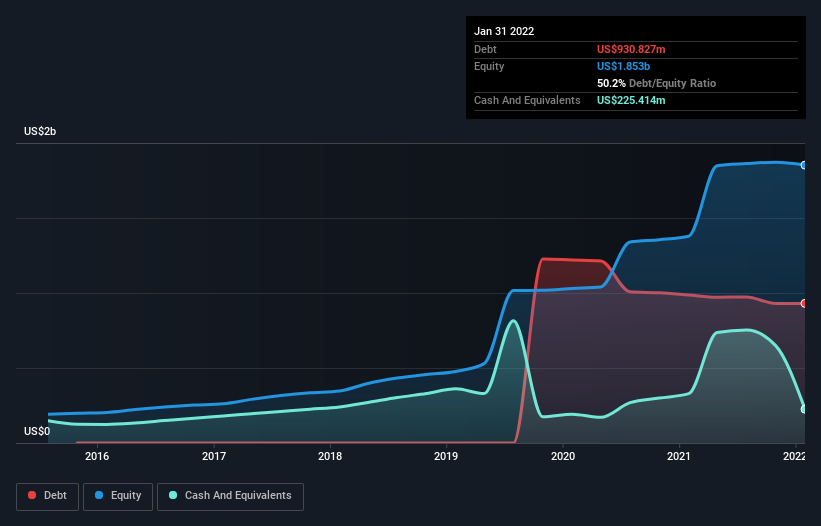- United States
- /
- Healthcare Services
- /
- NasdaqGS:HQY
These 4 Measures Indicate That HealthEquity (NASDAQ:HQY) Is Using Debt Extensively

Howard Marks put it nicely when he said that, rather than worrying about share price volatility, 'The possibility of permanent loss is the risk I worry about... and every practical investor I know worries about.' So it might be obvious that you need to consider debt, when you think about how risky any given stock is, because too much debt can sink a company. We can see that HealthEquity, Inc. (NASDAQ:HQY) does use debt in its business. But the more important question is: how much risk is that debt creating?
Why Does Debt Bring Risk?
Debt is a tool to help businesses grow, but if a business is incapable of paying off its lenders, then it exists at their mercy. Ultimately, if the company can't fulfill its legal obligations to repay debt, shareholders could walk away with nothing. However, a more frequent (but still costly) occurrence is where a company must issue shares at bargain-basement prices, permanently diluting shareholders, just to shore up its balance sheet. Of course, debt can be an important tool in businesses, particularly capital heavy businesses. The first thing to do when considering how much debt a business uses is to look at its cash and debt together.
See our latest analysis for HealthEquity
How Much Debt Does HealthEquity Carry?
The image below, which you can click on for greater detail, shows that HealthEquity had debt of US$930.8m at the end of January 2022, a reduction from US$986.7m over a year. However, it also had US$225.4m in cash, and so its net debt is US$705.4m.

How Strong Is HealthEquity's Balance Sheet?
According to the last reported balance sheet, HealthEquity had liabilities of US$153.2m due within 12 months, and liabilities of US$1.10b due beyond 12 months. Offsetting these obligations, it had cash of US$225.4m as well as receivables valued at US$87.4m due within 12 months. So its liabilities total US$941.7m more than the combination of its cash and short-term receivables.
Given HealthEquity has a market capitalization of US$5.06b, it's hard to believe these liabilities pose much threat. However, we do think it is worth keeping an eye on its balance sheet strength, as it may change over time.
We measure a company's debt load relative to its earnings power by looking at its net debt divided by its earnings before interest, tax, depreciation, and amortization (EBITDA) and by calculating how easily its earnings before interest and tax (EBIT) cover its interest expense (interest cover). The advantage of this approach is that we take into account both the absolute quantum of debt (with net debt to EBITDA) and the actual interest expenses associated with that debt (with its interest cover ratio).
While HealthEquity's debt to EBITDA ratio (4.0) suggests that it uses some debt, its interest cover is very weak, at 1.2, suggesting high leverage. In large part that's due to the company's significant depreciation and amortisation charges, which arguably mean its EBITDA is a very generous measure of earnings, and its debt may be more of a burden than it first appears. So shareholders should probably be aware that interest expenses appear to have really impacted the business lately. Even worse, HealthEquity saw its EBIT tank 49% over the last 12 months. If earnings continue to follow that trajectory, paying off that debt load will be harder than convincing us to run a marathon in the rain. There's no doubt that we learn most about debt from the balance sheet. But it is future earnings, more than anything, that will determine HealthEquity's ability to maintain a healthy balance sheet going forward. So if you want to see what the professionals think, you might find this free report on analyst profit forecasts to be interesting.
But our final consideration is also important, because a company cannot pay debt with paper profits; it needs cold hard cash. So we always check how much of that EBIT is translated into free cash flow. Over the most recent three years, HealthEquity recorded free cash flow worth 66% of its EBIT, which is around normal, given free cash flow excludes interest and tax. This free cash flow puts the company in a good position to pay down debt, when appropriate.
Our View
While HealthEquity's interest cover makes us cautious about it, its track record of (not) growing its EBIT is no better. But its not so bad at converting EBIT to free cash flow. We should also note that Healthcare industry companies like HealthEquity commonly do use debt without problems. When we consider all the factors discussed, it seems to us that HealthEquity is taking some risks with its use of debt. While that debt can boost returns, we think the company has enough leverage now. In light of our reservations about the company's balance sheet, it seems sensible to check if insiders have been selling shares recently.
When all is said and done, sometimes its easier to focus on companies that don't even need debt. Readers can access a list of growth stocks with zero net debt 100% free, right now.
Valuation is complex, but we're here to simplify it.
Discover if HealthEquity might be undervalued or overvalued with our detailed analysis, featuring fair value estimates, potential risks, dividends, insider trades, and its financial condition.
Access Free AnalysisHave feedback on this article? Concerned about the content? Get in touch with us directly. Alternatively, email editorial-team (at) simplywallst.com.
This article by Simply Wall St is general in nature. We provide commentary based on historical data and analyst forecasts only using an unbiased methodology and our articles are not intended to be financial advice. It does not constitute a recommendation to buy or sell any stock, and does not take account of your objectives, or your financial situation. We aim to bring you long-term focused analysis driven by fundamental data. Note that our analysis may not factor in the latest price-sensitive company announcements or qualitative material. Simply Wall St has no position in any stocks mentioned.
About NasdaqGS:HQY
HealthEquity
Provides technology-enabled services platforms to consumers and employers in the United States.
Solid track record with reasonable growth potential.

